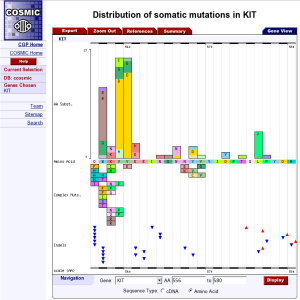COSMIC First Anniversary

What has it achieved in its first year?
In a remarkable effort, data originally published in the scientific literature for more than 100,000 tumour samples have been examined and incorporated into COSMIC, a freely available resource created by the Wellcome Trust Sanger Institute. These mutations cover 21 cancer genes, which, between them, carry more than 18,000 mutations.
“To understand cancer and to find new treatments, we need to understand the genetic changes underlying the disease. COSMIC gives all researchers free access to a growing collection of carefully reviewed DNA mutation and disease information that was previously spread across decades of scientific publications.”
Dr Richard Wooster Senior Investigator at the Wellcome Trust Sanger Institute
All cancers arise because cells acquire DNA sequence abnormalities – mutations – some of which cause the cells in which they have occurred to grow more successfully than their neighbours.
There is a vast amount of information available in the published scientific literature about these changes. COSMIC stores and displays details of these mutations together with clinical information.
“A bewildering array of mutations and chromosomal aberrations are involved in cancer. In our database we have catalogued changes in chromosome structure in cancer while COSMIC has focussed on the smaller, intragenic, mutations in specific cancer genes. To have produced the COSMIC database in only one year is a remarkable achievement.”
Felix Mitelman Head of the Institute of Laboratory Medicine at Lund University, Sweden
COSMIC catalogues somatic mutations (those that are not inherited) that are implicated in cancers, and provides additional information about benign growths as well as tumours, assessment of the literature and – importantly – results in which no mutation has been found. This is critical in defining the true mutation incidence of each cancer gene, a figure that is usually only an estimate.
If a researcher finds a mutation, he or she can inspect COSMIC to see where else that mutation plays a role. If a clinician or researcher has an interest in a particular tumour type, he or she can uncover the mutations identified in that tumour.
“Alterations, mutations, in our DNA sequence are fundamental to cancer. Our work has focused on discovering these mutations in colorectal cancer. COSMIC lets us place our data in context with previously published work and provides a definitive genetic underpinning to cancer research. This growing catalogue is a unique resource for the oncological research community.”
Victor Velculescu Assistant Professor of Oncology at The Sidney Kimmel Comprehensive Cancer Center at Johns Hopkins Medical School, Baltimore, USA
“COSMIC is particularly valuable because of its high level of assessment of the research, its careful description of tumours and – just as important – its comprehensive reporting of samples that do not contain mutations: these can be just as important as positive results, but are often difficult for research groups to find.”
“Ultimately, the COSMIC team in collaboration with our group aim to merge information on all types of somatic mutation in cancer in one database. This is an enormous task, but will provide an indispensable informational resource for all cancer scientists.”
Felix Mitelman Head of the Institute of Laboratory Medicine at Lund University, Sweden
COSMIC will continue to expand with plans to add mutation data from many more known cancer genes. In addition the completion of the human genome sequence provides the opportunity to sequence all known human genes to identify the complete catalogue of human cancer genes. The Wellcome Trust Sanger Institute is undertaking this work and will publish this data through COSMIC. A comprehensive list of human cancer genes can be used to develop therapeutic targets that are directed towards the underlying mutations that cause cancer.
More information
COSMIC
is designed to store and display somatic mutation information and related details and contains information relating to human cancers. All cancers arise as a result of the acquisition of a series of fixed DNA sequence abnormalities, mutations, many of which ultimately confer a growth advantage upon the cells in which they have occurred. There is a vast amount of information available in the published scientific literature about these changes. COSMIC provides a consistent interface to genes, histology, tissues and mutations.
Websites
- COSMIC – Catalogue Of Somatic Mutations In Cancer
- Mitelman Database of Chromosome Aberrations in Cancer
Selected websites
The Wellcome Trust Sanger Institute
The Wellcome Trust Sanger Institute, which receives the majority of its funding from the Wellcome Trust, was founded in 1992. The Institute is responsible for the completion of the sequence of approximately one-third of the human genome as well as genomes of model organisms and more than 90 pathogen genomes. In October 2006, new funding was awarded by the Wellcome Trust to exploit the wealth of genome data now available to answer important questions about health and disease.
The Wellcome Trust and Its Founder
The Wellcome Trust is the most diverse biomedical research charity in the world, spending about £450 million every year both in the UK and internationally to support and promote research that will improve the health of humans and animals. The Trust was established under the will of Sir Henry Wellcome, and is funded from a private endowment, which is managed with long-term stability and growth in mind.


